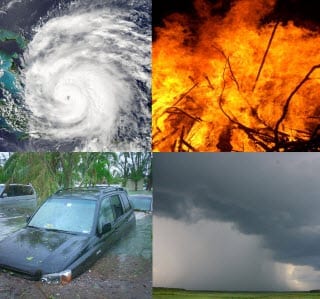The natural disaster rate climbs as industry reevaluates high risk areas.
 Natural disasters seem to be happening more regularly, a fact that the global insurance industry is becoming uncomfortable with. In terms of insurance, powerful storms and weather-related catastrophes are becoming more commonplace. As such, insurers are feeling the pressure of increased liability and the potential for steep financial losses in the wake of a catastrophic event. There is a strange trend gaining momentum in the industry today, which is spurred by the severity of recent natural disasters. Insurance markets all over the world are noting an exodus of insurance companies that once served these sectors.
Natural disasters seem to be happening more regularly, a fact that the global insurance industry is becoming uncomfortable with. In terms of insurance, powerful storms and weather-related catastrophes are becoming more commonplace. As such, insurers are feeling the pressure of increased liability and the potential for steep financial losses in the wake of a catastrophic event. There is a strange trend gaining momentum in the industry today, which is spurred by the severity of recent natural disasters. Insurance markets all over the world are noting an exodus of insurance companies that once served these sectors.
The Consumer Federation of America has evaluated claims of insurance companies abandoning certain markets and has determined that this is, indeed, the case. The Federation notes that “insurance companies have significantly and methodically decreased their financial responsibility for weather catastrophes… in recent years.” This assessment from the Consumer Federation of America is substantiated by the Insurance Information Institute, which notes 2011 as the year in which insurers took a “step back to assess whether or not they can absorb severe losses.”
In the U.S., insurance companies are pulling out of markets as a way to regain some semblance of control over their financial liability and risk exposure. In Florida, several insurers have stopped providing coverage for hurricanes and flooding disasters, leaving nearly 1.5 million without coverage. The slack has been taken up by the state’s Citizens Property Insurance Corporation, but the exodus of insurers has created financial challenges for the state when it comes to natural disasters. Though a major hurricane has not made landfall in Florida in several years, the state is still considered one of the most costly places for insurance companies to do business in the country, and many of these insurers are unwilling to stay in the market.
The Consumer Federation has released a report that suggests that property insurers are selling watered-down policies that are more extensive than they should be. Essentially, this means that consumers could be paying more for policies that do not offer comprehensive coverage for natural disasters. Insurance groups decry this claim, arguing that many cities throughout the country that have experienced significant damage from natural disasters are being rebuilt because of the payouts from these policies.
